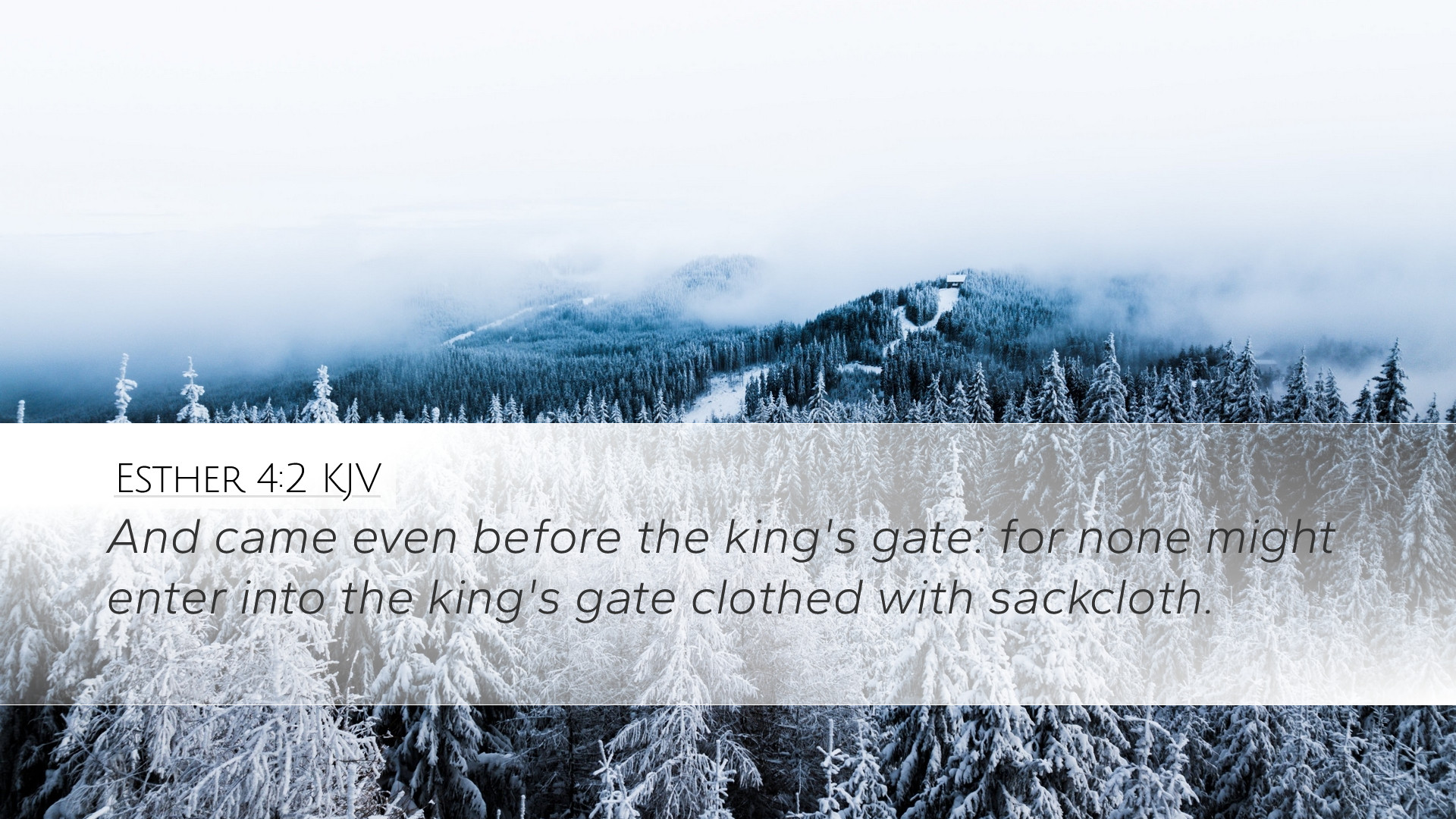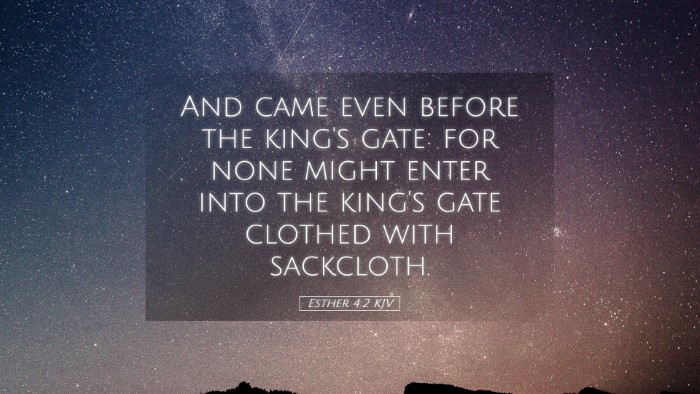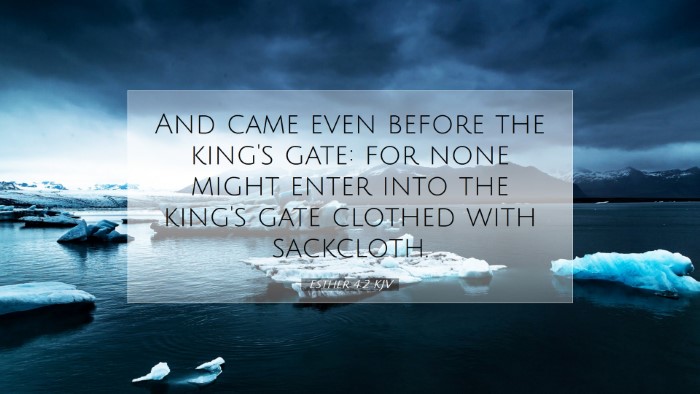Old Testament
Genesis Exodus Leviticus Numbers Deuteronomy Joshua Judges Ruth 1 Samuel 2 Samuel 1 Kings 2 Kings 1 Chronicles 2 Chronicles Ezra Nehemiah Esther Job Psalms Proverbs Ecclesiastes Song of Solomon Isaiah Jeremiah Lamentations Ezekiel Daniel Hosea Joel Amos Obadiah Jonah Micah Nahum Habakkuk Zephaniah Haggai Zechariah MalachiEsther 4:2
Esther 4:2 KJV
And came even before the king's gate: for none might enter into the king's gate clothed with sackcloth.
Esther 4:2 Bible Commentary
Bible Commentary on Esther 4:2
Verse: "And came even before the king's gate; for none might enter into the king's gate clothed with sackcloth." - Esther 4:2
Introduction
The Book of Esther is a unique narrative within the canon of Scripture, depicting the sovereign hand of God in the lives of His people amid exile and danger. Esther 4:2 portrays a moment of profound emotional turmoil and conflict, woven into the fabric of the larger story of God’s providence. This commentary aims to provide insights from respected public domain commentaries to illuminate the significance of this verse.
Contextual Analysis
Esther 4:2 occurs during a critical moment when Mordecai learns of the decree to annihilate the Jews. His distress is palpable as he demonstrates his grief by donning sackcloth and ashes, a traditional Jewish expression of mourning.
- Mordecai’s Mourning: The act of wearing sackcloth signifies repentance and deep sorrow, indicating Mordecai’s recognition of the dire situation facing his people.
- Prohibition of Sackcloth: The verse notes the king’s gate as a place where mourning attire is forbidden, emphasizing the oppressive atmosphere of Persia and the sensitivity of court decorum.
Insights from Commentaries
Matthew Henry
Matthew Henry highlights the depth of Mordecai's distress and the symbolic act of wearing sackcloth. He notes that "Mordecai's mourning at the king’s gate was a public display of grief, compelling enough to reach the queen herself." Henry astutely remarks that the reality of the situation is such that "Mordecai understood the gravity of the threat against his people," showing his role as a faithful guardian of Jewish tradition and identity.
Albert Barnes
Albert Barnes elaborates on the significance of the king's gate in Persian culture. He explains that the gate was a representation of power and authority, and that Mordecai's actions were deliberately public and fervent. Barnes states, "His refusal to abide by the decorum of the court illustrates the intensity of his concern for the fate of his people." He emphasizes that this moment sets the stage for Esther's eventual intercession.
Adam Clarke
Adam Clarke takes a different angle, considering the spiritual dimensions of the text. He posits that Mordecai's actions were not merely political but underscored a profound spiritual reality. Clarke asserts, "Mordecai’s public grief was a call to repentance for the Jewish people, recognizing that their sins had led to their current peril." This marks a pivotal moment in the narrative, linking the fate of the Jews with their covenant relationship with God.
Theological Implications
Esther 4:2 serves as a lens through which one can examine broader theological themes including:
- God's Sovereignty: The events leading to Esther’s rise as queen are not coincidental. God orchestrates these moments in a way to fulfill His covenant promises to the Jewish people.
- The Power of Intercession: Mordecai's actions foreshadow the critical role Esther will play in advocating for her people, highlighting the necessity of courage and faith in times of crisis.
- Corporate Mourning and Repentance: The necessity for communal acknowledgment of sin and a return to God is presented as crucial, inviting leaders and followers alike to call upon the Lord in times of need.
Application for Modern Readers
For pastors, students, theologians, and Bible scholars, Esther 4:2 challenges the contemporary believer to reflect on the following:
- Personal and Corporate Grief: How do we express our sorrow for the issues facing our communities and nations? Mordecai's example invites modern believers to consider how public acts of grief and repentance can impact societal change.
- Standing Up for Justice: Just as Mordecai boldly mourns for his people, how are we called to act in defense of those marginalized or oppressed in today’s world?
- Faith in Crisis: This passage encourages believers to trust in God’s sovereignty amid chaos, reflecting on His provisions and timing in our lives.
Conclusion
Esther 4:2 is a poignant reminder of the anguish felt by God’s people and the call to action in the face of oppression. The insights from respected commentaries reveal a multifaceted understanding of the text, inviting readers into a deeper engagement with the themes of grief, intercession, and divine sovereignty. As we explore the narratives surrounding Esther and Mordecai, may we find conviction to stand firm in our faith and advocate for justice.


